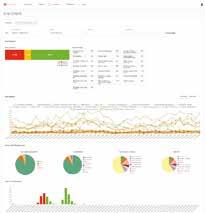
6 minute read
CYBERSECURITY
PLATFORMS & TECHNOLOGY
Crime of the century
Advertisement
Rick McElroy outlines just how rampant cybercrime has become during the pandemic and what all industry players need to do about it
The global health crisis has accelerated the digital transformation initiatives of many organisations. Unfortunately, the urgency associated with rolling out these plans has meant an increase in the risk of cyberattacks. With a mass shift to establish remote workforces, organisations have inadvertently relaxed security or misconfigured devices. The distributed workforce has introduced changes for security professionals as well, who are now on the frontlines of enabling and securing newly distributed workforces.
These gaps in traditional cyber defences, combined with changing working patterns and employee behaviour, have created a larger surface area for cyberattacks which make it more difficult to spot such attacks. And amid the disruption, COVID-19 has exposed the UK to an unprecedented level of cyberattacks.
As part of the VMware Carbon Black Global Threat Report Series, we discovered that COVID-19 has opened the door for a surge in cyber incidents. Almost every UK business (99 percent) surveyed suffered at least one
The mobile spike
The total number of mobile applications identified as malicious in the first quarter of 2020 doubled compared to the first quarter of 2019.
So says data from Secure-D, Upstream’s full stack anti-fraud platform, covering 31 mobile operators in 20 countries at the beginning of 2020. In Q1 the security platform detected more than 29,000 malicious apps versus just over 14,500 during the same quarter of last year.
The first quarter also saw a dramatic 55% spike in the number of fraudulent mobile transactions and an increase in the number of malware infected mobile devices.
The data demonstrates that alarmingly, nine of the 10 top malicious apps of 2020 for the quarter are – or were at some point – available on Google Play, meaning they have passed the security checks in place.
For the full year 2019 the proportion of the top 100 malicious apps available on Google Play stood at 30%, according to Secure-D’ proprietary data for the year.
With lockdowns in effect in most parts of the world for a good part of the quarter, this indicates that fraudsters have been targeting applications that people download as they look to pass the time and entertain themselves, unable to socialize and venture outdoors.
Geoffrey Cleaves, Head of Secure-D at Upstream, explains: “With the majority of the world having shifted indoors, there were some darker forces acting to make a profit from the lockdown situation. At Secure-D, we’ve seen a sharp increase in bad actors publishing “leisure” apps on the Google Play Store, which trick users into subscribing for premium services.”
Fraudsters tend to target Android handsets specifically because the operating system is easier to work with, with a host of unofficial places to visit and download apps. In markets like Brazil, a large proportion of consumers use prepaid credit to purchase digital services, enabling bad actors to subscribe users to services without their knowledge.
The most troublesome app to date in 2020 is Snaptube, a video downloader app that has been downloaded more than 40 million times worldwide. In 2019, Upstream’s Secure-D platform logged 70 million fraudulent transactions through the same app – more than half of them in Brazil.
Furthermore, in the first quarter of 2020, Upstream’s security platform processed more than 326 million mobile transactions and blocked almost 290 million, having identified 89% of total transactions as fraudulent. The data highlights a dramatic spike in the number of global transactions blocked as fraudulent, up 55% from the previous year, when 186 million were blocked out of the 208 million transactions processed.
It is unknown at this stage how the COVID-19 pandemic will shape 2020 figures, but the impact is likely to be significant. Cleaves explains: “Being in lockdown means prepaid customers will find it difficult to get out the front door to top up their data bundles. In the meantime, malware could be eating into those data bundles. I suspect we may see a drop in mobile internet traffic, and successful billing attempts, in predominantly prepaid developing markets while lockdowns are in force”. security breach in the last 12 months. Ninety-eight percent of the CIOs, CTOs and CISOs also confirmed that attack volumes increased in the last 12 months. More than nine out of 10 noted the increase in attacks were related to employees working from home during COVID-19 stay at home orders.
FENDING SOPHISTICATED CYBERATTACKS
It’s not just the frequency of attacks that is concerning – it’s the growing sophistication of attacks. For example, cybercriminals are exploiting the crisis to launch a wave of ‘fearware’ attacks. These often take the form of phishing attacks or email fraud that seek to exploit users’ concerns surrounding COVID-19. In fact, 93 percent of UK respondents reported being targeted by COVID-19-related malware.
It is also worth pointing out other major threats: For example, OS vulnerabilities are the leading cause of breaches in 2020 our research found. However, it also highlighted that island-hopping and third-party application attacks still cause a disproportionate percentage of breaches.
As both a cause and a consequence, the dark web is thriving during COVID-19, with the commoditisation of malware making more sophisticated attack techniques available to a growing number of cybercriminals. Common commodity malware like ransomware is starting to exhibit sophisticated behaviours, executing more destructive attacks, performing credential harvesting and making lateral movements once it breaches a system.
We are also seeing more secondary extortion plots, with attackers causing more damage
once they gain access to an organisation or individual’s data. As seen with the increase in islandhopping and third-party application attacks, adversaries have moved from burglary, to home invasion, to digital squatting.
GREATER COLLABORATION
So, what can organisations do to protect their infrastructure, data and employees in this heightened threat landscape? Most are responding by directing their budgets towards security solutions with more than 99 percent of respondents planning to increase cyber defence spending in the coming year. The good news is that organisations are now starting to recognise the value of threat hunting to help identify malicious actors.
As organisations increase spending, they must also consider their security strategies. Today, many UK organisations are using a variety of different security technologies resulting in siloed, hard-to-manage environments that play into attackers’ hands. Evidence shows that attackers have the upper hand when security is not an intrinsic feature of the environment. As the cyber threat landscape reaches saturation, it is time for rationalisation, strategic thinking, and clarity
over security deployment.
The report also found that an inability to institute multifactor authentication is one of the biggest threats that businesses face with security right now. Multifactor authentication is an integral part of a security posture to stop traditional credential harvesting methods and should be extended as far as possible.
The unexpected disruption of COVID-19 has seen the rise of global threats. In unprecedented times, organisations must focus on proactive threat hunting to detect attacks before they have a chance to cause catastrophic damage, not just here in the UK but on a global scale.
Rick McElroy, Cybersecurity Strategist, VMware Carbon Black
visit us:
with the industry-standard solution
Combat all types of fraud
Our multilayered approach identifies all types of DCB, affiliate and CPI fraud Reduce your customer complaints significantly


Stay below defined complaint rates
Protect future revenues
By automatically blocking & dynamically punishing fraudulent market players
Safeguard your reputation


Don’t let carrier billing become a risk to your reputation and brand
NEW
Overwatch Partner Program Are you well-connected in the VAS industry (mobile carriers, billing service providers, etc.)? Join our partner program and benefit from an attractive scheme - partner@veneoverwatch.io
Easy to integrate
Setup within a day. We provide a personal integration manager





